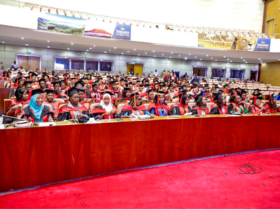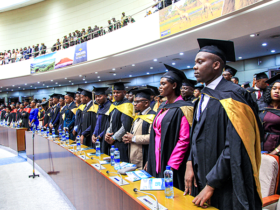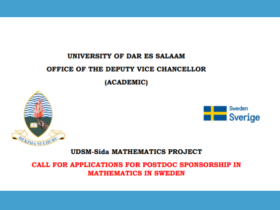
Scholarships in Tanzanian Universities; Scholarships play a pivotal role in enhancing access to higher education, particularly in countries like Tanzania, where financial barriers often hinder students from pursuing their academic aspirations.
Scholarships not only help ease financial burdens but also promote academic excellence, equity, and capacity-building in Tanzania’s education sector.
Tanzanian universities offer a variety of scholarships to support students in need and reward academic achievements, with funding provided by both local and international organizations.
This post will delve into the scholarship landscape in Tanzania, exploring available options, eligibility requirements, application processes, and how scholarships impact both individual lives and the nation’s progress.

Scholarships in Tanzanian Universities
1. Types of Scholarships Available in Tanzanian Universities
Scholarships in Tanzanian universities are diverse, aiming to address various needs and fields of study. They are typically categorized as:
- Merit-Based Scholarships: These scholarships reward students with high academic achievement, offering financial support to top performers in secondary schools, diploma programs, or pre-university exams. Many universities in Tanzania, such as the University of Dar es Salaam (UDSM) and the Nelson Mandela African Institution of Science and Technology, offer merit-based scholarships to attract high-performing students.
- Need-Based Scholarships: For students from economically disadvantaged backgrounds, need-based scholarships provide critical financial assistance. These scholarships are awarded based on family income, socio-economic status, and financial need, aiming to ensure that capable students from low-income families have access to higher education.
- Field-Specific Scholarships: Certain scholarships target specific fields of study deemed crucial for national development, such as medicine, engineering, and education. For example, medical and health sciences students may find targeted scholarships to encourage more Tanzanians to enter these vital fields, thereby addressing workforce gaps.
- Government and International Scholarships: Scholarships funded by government agencies and international organizations are common in Tanzania. These include opportunities offered by the Tanzanian Higher Education Students’ Loans Board (HESLB), as well as scholarships from organizations like the World Bank, the Commonwealth, and the African Development Bank.
- Institutional Scholarships: Many Tanzanian universities have internal scholarship programs, which are often funded through partnerships with private sectors, alumni associations, or foundations. These scholarships typically aim to attract top talent to specific programs and fields within the university.
2. Notable Scholarship Programs for Tanzanian Students
Several prominent scholarship programs have helped thousands of Tanzanian students pursue higher education. These include:
- Higher Education Students’ Loans Board (HESLB): HESLB is one of the largest sources of financial aid in Tanzania, providing loans and partial scholarships to students in recognized universities and colleges across the country. HESLB focuses on needy students, particularly those in priority fields, and its loan repayment model is structured to allow students to pay back the funds over time.
- Commonwealth Scholarships: Commonwealth Scholarships offer Tanzanian students an opportunity to study abroad at institutions within the Commonwealth nations. These scholarships cover a wide range of programs, from undergraduate to postgraduate studies, with a focus on areas critical for socio-economic development.
- DAAD Scholarships: The German Academic Exchange Service (DAAD) offers scholarships for Tanzanian students pursuing postgraduate studies in Germany. These scholarships cover tuition, living expenses, and research costs, with a focus on building academic capacities in various disciplines.
- MasterCard Foundation Scholars Program: This prestigious program partners with institutions across Africa, including universities in Tanzania, to provide full scholarships to promising young African leaders. The scholarships support students from economically disadvantaged backgrounds, offering a transformative opportunity to study and develop leadership skills.
- China-Tanzania Scholarships: The Chinese government provides full and partial scholarships to Tanzanian students, enabling them to pursue undergraduate and postgraduate studies in China. This program also includes fields like engineering, medicine, and social sciences, further strengthening Tanzanian-China relations.
3. Eligibility and Application Process
Scholarship eligibility and application procedures vary depending on the institution and the type of scholarship. Key requirements often include:
- Academic Excellence: Most scholarships, especially merit-based ones, require a strong academic record. Some programs may set minimum grade requirements, such as a GPA of 3.5 or higher, while others may base eligibility on competitive exams or previous academic achievements.
- Financial Need: For need-based scholarships, applicants typically provide financial documentation or proof of income to demonstrate financial need. This may include family income statements, household details, and letters of recommendation from community leaders or educational institutions.
- Field of Study and Program: Scholarships focusing on specific fields, such as engineering or medicine, require students to be enrolled in relevant programs. Some scholarships also prioritize areas aligned with national development goals, such as technology, health, and agriculture.
- Application Procedure: Scholarship applications usually involve submitting a formal application form, academic transcripts, letters of recommendation, and a personal statement. Some programs require additional documentation, such as research proposals for postgraduate scholarships.
- Application Deadlines: Each scholarship has its own timeline, so students must stay informed of deadlines and submit applications in advance. Institutions and funding bodies typically post deadlines on their websites, and students are encouraged to track these dates.
4. Impact of Scholarships on Tanzanian Students and Society
Scholarships play a transformative role in shaping individual lives and promoting socio-economic progress. Some of these impacts include:
- Improved Access to Higher Education: Scholarships make higher education accessible for students who may not have the means to pursue university studies. By supporting these students, scholarships help increase university enrollment and create a more educated population.
- Reduction in Dropout Rates: Financial challenges often lead to high dropout rates. Scholarships alleviate these concerns, helping students stay in school and complete their studies, especially for economically vulnerable students.
- Promotion of Gender Equality: Many scholarships specifically target female students, especially in traditionally male-dominated fields like STEM (science, technology, engineering, and mathematics). By promoting gender equality, scholarships contribute to more balanced representation in the workforce and leadership.
- Development of Skilled Professionals: Scholarships aimed at fields with skill shortages help produce qualified professionals who can contribute to Tanzania’s socio-economic development. For instance, scholarships for medical students help address the demand for healthcare workers, while scholarships in engineering support Tanzania’s infrastructure growth.
- Leadership and Capacity-Building: International scholarships expose students to diverse learning environments, equipping them with global perspectives and skills. Many scholarship recipients return to Tanzania with knowledge and experiences that benefit local industries, education, and governance.
5. Challenges in Accessing Scholarships
While scholarships open doors for many, challenges still exist:
- Awareness Gaps: Many students are unaware of scholarship opportunities due to limited access to information, especially those in remote areas. Improved communication channels, such as outreach programs and online platforms, could help bridge this gap.
- High Competition: Scholarships, especially fully funded ones, are highly competitive. The limited number of slots means that not all deserving students secure support, leading to financial strain for some families.
- Eligibility Barriers: Some scholarships have stringent eligibility criteria, such as age limits or specific academic thresholds. These requirements can exclude capable students who may narrowly miss the criteria.
Conclusion
Scholarships are vital for fostering educational opportunities, bridging financial gaps, and promoting equitable access to higher education in Tanzania.
They support students from various backgrounds, empower women in male-dominated fields, and encourage students to pursue critical disciplines for national development.
However, to maximize their impact, efforts are needed to increase awareness, expand scholarship opportunities, and address the high demand for financial assistance.
By investing in scholarships and supporting deserving students, Tanzania can cultivate a well-educated, skilled workforce ready to contribute to the country’s growth and prosperity.
Scholarships in Tanzanian universities represent not only individual success stories but also the promise of a brighter, more inclusive future for all.
Related articles








Leave a Reply